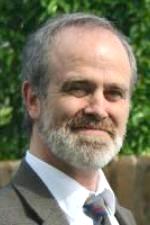ATLANTA – Mercer University's James and Carolyn McAfee School of Theology will welcome Dr. Terrence Deacon, professor of biological anthropology at the University of California, Berkeley, for the seventh annual D. Perry and Betty Ginn Lectures on Christian Faith and Modern Science Oct. 6-7 on the Cecil B. Day Campus in Atlanta.
“The Ginn Lectures each year open our horizons to new questions and a fresh appreciation of the importance of the dialogue between science and theology,” said Dr. R. Alan Culpepper, dean of the School of Theology. “Dr. Deacon's work on the development of the mind and the human capacity for language and speech has been groundbreaking. We look forward to engaging the questions his work poses for Christian understandings of God, God's work as creator and the place of human beings in the created order.”
Dr. Deacon's research combines human evolutionary biology and neuroscience, with the aim of investigating the evolution of human cognition. His work extends from laboratory-based cellular-molecular neurobiology to the study of semiotic processes underlying animal and human communication, especially language. Many of these interests are explored in his book
The Symbolic Species: The Coevolution of Language and the Brain (W.W. Norton and Co., 1997).
Dr. Deacon will deliver two lectures, both free and open to the public, in Cecil B. Day Hall. The first, titled “Naturalizing Teleology: The Rediscovery of Self and Value,” will take place on Oct. 6 at 4 p.m., and the second, titled “The Attraction and Pitfalls of Believing in a Bi-layered World,” will take place on Oct. 7 at 10:45 a.m.
Dr. Deacon's neurobiological research is focused on determining the nature of the human divergence from typical primate brain anatomy, the cellular-molecular mechanisms producing this difference, and the correlations between these anatomical differences and special human cognitive abilities, particularly language. In pursuit of these questions, he has used a variety of laboratory approaches, including the tracing of axonal connections, quantitative analysis of regions of different species brains, and cross-species fetal neural transplantation. The goal is to identify elements of the developmental genetic mechanisms that distinguish human brains from other ape brains to aid the study of the cognitive consequences of human brain evolution.
His theoretical interests include the study of evolution-like processes at many levels, including their role in embryonic development, neural signal processing, language change and social processes, and how these different processes interact and depend on each other. Currently, his theoretical interests have focused on the problem of explaining emergent phenomena, which characterize such apparently unprecedented transitions as the origin of life, the evolution of language and the generation of conscious experience by brains. This is fueled by a career-long interest in the ideas of the late 19th-century American philosopher Charles Sanders Peirce and his theory of semiosis. Dr. Deacon's latest book,
Incomplete Nature: How Mind Emerged from Matter (W.W. Norton and Co., 2011), explores the relationship between thermodynamic, self-organizing, evolutionary and semiotic processes and provides a new technical conception of information that explains both its representational and normative properties.
Dr. Deacon earned his Ph.D. in biological anthropology from Harvard University in 1984. He has served as a professor at Harvard, Boston University and the University of Washington as well as a research associate at Harvard Medical School prior to his current appointment in the Department of Anthropology and Helen Wills Neuroscience Institution at UC Berkeley.
The D. Perry and Betty H. Ginn Lectures in Christian Faith and Modern Science were endowed by the Rev. Dr. D. Perry Ginn to encourage a deeper understanding of science by clergy and students and how it relates to the Biblical revelation.
For more information, contact Diane Frazier at (678) 547-6470 or
frazier_d@mercer.edu.
About the James and Carolyn McAfee School of Theology
The McAfee School of Theology was established in 1996. Located in Atlanta on Mercer's Cecil B. Day Graduate and Professional Campus, the School of Theology offers programs leading to the degrees Master of Arts in Christian Ministry, Master of Divinity, and Doctor of Ministry. The School of Theology also offers several joint programs: an M.Div.-Master of Business Administration, an M.Div.-Master of Science in Counseling and an M.Div.-Master of Arts in Church Music through the Townsend-McAfee Institute for Graduate Church Music Studies, a collaborative program between the School of Theology and the Townsend School of Music in Macon. For more information, visit
theology.mercer.edu.










